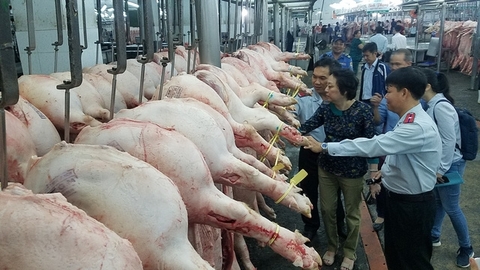
Customs staff check the quality and origin of live hog at Hóc Môn wholesale market. The price of pork is expected to decrease soon thanks to support from the Ministry of Agriculture and Rural Development. — Photo haiquanonline.com.vn
The Ministry of Agriculture and Rural Development (MARD) has asked pig breeding farms and households to reduce the price of live hog to VND70,000 (US$3) per kilo in order to stabilise the domestic market during the COVID-19 pandemic.
In a request sent to people’s committees of all cities and provinces nationwide, the ministry said 15 major livestock enterprises, including CP Viet Nam Company, Mavin Group, CJ Vina Company, Dabaco, Japfa Comfeed and Emivest, have all reduced the live hog price to VND70,000 from VND75,000 since April 1.
Some of them have lowered it to VND65,000-VND67,000 per kilo.
However, the total number of pigs slaughtered by 15 enterprises accounts for 35-40 per cent of the total supply, the rest comes from local farms and households with prices ranging from VND73,000 to VND78,000 per kilo of live hog, affecting the overall price of pork at the market.
MARD requested leaders of local authorities to follow the Prime Minister’s guidance on solutions on stabilising pork prices strictly, suggesting them to review and control the selling prices of live hog and pork in localities.
“All farms and households need to accompany 15 enterprises to decrease the prices to VND70,000 per kilo of live hog, proceeding to VND65,000 and VND60,000, and lower,” MARD said.
The price of live hog in the Vietnamese market started increasing since early last year as the country was facing a shortage in supply caused by African swine fever. The price of live hog ranged between VND45,000-VND50,000 prior to the outbreak of African swine fever.
To cool off skyrocketing pork prices in the market, Viet Nam has pushed up imports of pork from many countries, including Canada, Russia, Germany, Poland, Brazil and the US. In the first quarter of this year, the country imported 39,200 tonnes of pork, up 312 per cent year-on-year. — VNS